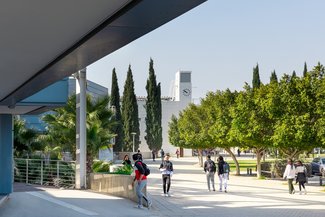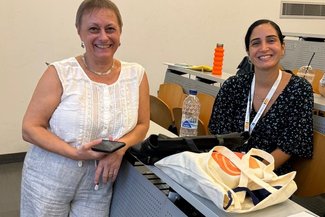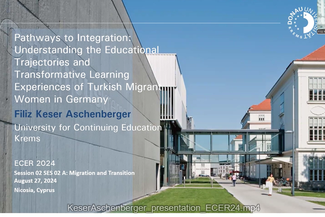At the end of August, colleagues from Edge met with researchers from across Europe to deliver a symposium at the 2024 ECER (European Conference on Educational Research), at The University of Cyprus in Nicosia. The symposium was on migrants' transition to successful pathways and integration. There were six contributions from Switzerland, England, Sweden and Germany, addressing the following questions:
- How can individuals, networks, and institutions working together create an enabling ecosystem that may enhance migrants' opportunities and lead to their social and economic integration?
- How do the life transitions of migrants manifest within this ecosystem?

Barbara Stalder’s (Bern University of Teacher Education) research question that guides her study is whether prevocational programmes can foster the integration of displaced people in VET. Exploring data from the pre-apprenticeship for integration (PAI) in Switzerland, they have shown that the learning environment greatly matters. Refugees who learn a lot in the workplace and school, those who feel well supported by teachers and trainers, and who understand that having a VET qualification is important are all key factors which makes them more likely to transition to an apprenticeship after the PAI. We continued the discussion by investigating the pathways of the less successful migrants: those who were not admitted to the programme and those who did not finish it. First results suggest that reasons for not starting/not finishing the PAI are manifold, including insufficient language and academic skills, persisting health problems and learning difficulties, and family/housing problems (e.g. lacking childcare facilities). The successful migrants are thus a selective group of those already better integrated (settled in) and more capable of adapting to the programme's demands.
Marlise Kammermann, from the Swiss Federal University for Vocational Education and Training, presented a research project funded by the Swiss National Science Foundation (SNSF), which analyses the role of workplace guidance in refugee apprentices’ development of agency. Interviews with in-company trainers and former PAI apprentices as well as with coaches, career counsellors, social workers and teachers, provide insights into guidance practices in the workplace. Preliminary results highlight the importance of language support at work. Frequently used such support is, for example, trainers’ demonstrating and commenting on professional actions, asking apprentices to regularly explain their approach to work assignments and providing time and support for PAI apprentices’ written learning and work journals. Equally important is the acceptance of refugee apprentices by, and their fit with, the team, for example in the company’s social activities and in mentoring and pairing PAI apprentices with co-workers and other apprentices.
Edge Foundation’s Andrea Laczik and Dana Dabbous represented the England research team. Their scoping project aligned well with the other presenters' research with its focus on VET programmes and English for Speakers of Other Languages provision. The study investigates how VET supports young migrants’ integration into the education system, and how this may impact on their integration into the labour market, and local communities. It examines young migrants’ aspirations and experiences with VET, based on interviews with 16 young migrants enrolled in various VET programmes at four Further Education colleges in England. While most participants spoke positively about their colleges, they also highlighted several challenges that could hinder their progress.

Among these were professional-level spoken and written English language skills, as well as a disconnect between their aspirations and the specific subject courses they were placed in. There was also a disconnect between the level of course they were placed in and the qualifications they already had from their home country. This led to delayed progress and funding seizing at the age of 18. Despite these issues, many acknowledged the valuable skills they gained that support them in their progress. The study's findings emphasise the need for more migrant-specific support and guidance in VET, reforms to the funding system for these students, and improved career advice tailored to young people with migrant backgrounds.
Lazaro Moreno Herrera and Ali Osman from Stockholm University contributed their insights into the Swedish labour market and immigration. Firstly, providing an historical context of the immigration boom of the 1950s-70s, followed by a deep dive into the automotive industry, which has a significant role not only in global and national economies, but also in the formation of the labour force by (re)training workers. While historically the automobile industry has attracted mostly low-skilled migrants for the assembly lines, presently there is an additional need for high-skilled and often STEM-educated migrant workers. Lazaro presented findings from a systematic literature review exploring the relationships between migrant labour and the car industry sector. The thematic analysis was summarised in four themes. Firstly, two profiles of the migrant worker were identified, corresponding to what is often discussed as low- and high- skilled workers. Secondly, the working conditions for the migrant labour force were prominent in the literature, while they varied based on the profile of the migrant worker. Thirdly, from a historical perspective, strikes were shown to affect migrants’ working conditions and rights, while fourthly, the business practice of offshoring was shown to influence migrant workforce conditions and status. In conclusion, Lazaro explained that the complexity of the issue under research, the scarcity of the relevant literature and the contextuality of the cases presented have been acting as limitations of this literature review. Further research on the topic is needed, since the car industry is a core player in national economies, and, hence, its influence on migration practices and policies should not be understudied.
Filiz Keser Aschenberger from University for Continuing Education Krems, Austria, was unable to join the symposium in person but shared her findings on "Pathways to Integration: Educational and Transformative Learning Experiences of Turkish Migrant Women in Germany" which you can see by clicking on the picture. The presentation explores how education shapes the lives of Turkish migrant women. Through biographical interviews, Filiz analyses how these women navigate educational challenges and their integration into German society. The presentation delves into the role of learning in reshaping their identities, fostering social inclusion, and overcoming intersectional barriers.
Although migrants face many challenges in their new environment, we learnt from these diverse, yet linked, presentations that across European societies, different measures have been developed to foster successful careers and to include migrants into labour market and society, such as VET or pre-VET provisions or programmes. Those programmes have a strong commitment to supporting the development of language skills as well as of professional knowledge and skills and to offer professional certificates in order to allow access to labour market. The symposium offered us an opportunity to better understand the multifaced challenges migrants can face and some of the ways we may better support their integration and transitions into the labour market.
The full proceeding for the symposium can be read on the VETNET website: https://vetnetsite.org/procpub/vetnet-ecer-proceedings-volume-vii-nicosia/


